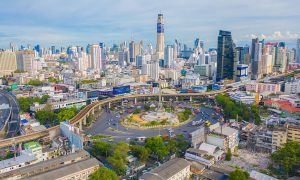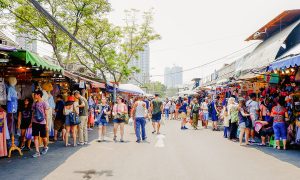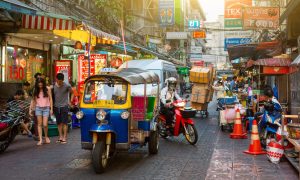In recent years, Thailand has attracted digital nomads with its low cost of living, comfortable climate and rich culture. As one of the centers of the digital economy in Southeast Asia, the Thai government has introduced the Digital Nomad Visa for remote workers and freelancers, providing a legal way for those who wish to live in the country for an extended period of time to work and live. In this article, we will analyze in detailThailand Digital Nomad VisaThe application requirements and process, as well as advice on life after moving to Thailand, help freelancers start their Thailand journey smoothly.
I. What is the Thailand Digital Nomad Visa?
The Thai Digital Nomad Visa is a special visa designed to attract global freelancers, remote workers and online entrepreneurs to live and work in Thailand. The visa provides applicants with a longer period of stay and more work flexibility than traditional visas, while ensuring their legal status.
The Digital Traveler Visa 2025 contains the following features:
- Valid for up to 10 years: Initial issuance is for 5 years, renewable once for a total of 10 years.
- multiple entry: Visa holders can travel freely between Thailand and other countries.
- Tax incentives: Applicants with a specified level of annual income are eligible for Thai tax incentives.
- Residence permits for family members: The applicant's spouse and minor children may accompany the applicant and be granted legal residence.
II. Conditions for applying for a digital nomad visa for Thailand
There are certain conditions that need to be met in order to apply for a digital nomad visa, and the following are the main requirements:
- Occupational requirements
- Freelancers or remote workers who need to prove that they work for an overseas business or client.
- Online entrepreneurs or business owners who hold Internet-related businesses.
- Income requirements
- Monthly income needs to be at least 80,000 baht (approximately US$2,300) or a total income of more than 3.2 million baht (approximately US$92,000) for the past two years.
- If income is below the above criteria, proof of bank deposit of at least US$100,000 is required.
- Work contracts and project certificates
- Provide a valid contract with an overseas employer or client, or proof that you own an operating Internet business.
- Health and criminal record
- A health certificate showing no history of significant infectious disease is required.
- A certificate of no criminal record, to be issued by the government of the host country or an international authority.
- Insurance requirements
- Hold a health insurance policy covering Thailand with a minimum coverage of US$50,000.
III. Application Process Details
- Online Application
Applicants are required to visit ThailandimmigrantsBureau or visa portal (e.g.Thailand Board of Investment(Official website) to submit the online application form and upload the relevant documents. - Submission of supporting documents
- Proof of identity: copy of passport (valid for at least 6 months).
- Proof of income: bank statements, tax records or salary certificates.
- Proof of employment: client contracts, business registration documents or online business descriptions.
- Health certificates and insurance policies.
- Application Review
Thailand ImmigrationIt usually takes 4-6 weeks for the Bureau to review the application materials. Applicants will be notified if additional materials are needed and must submit them in a timely manner. - Visa issuance
Upon approval, the applicant is required to pay the visa fee (approximately 50,000 Baht) and the visa will be issued. Applicants can choose to receive the visa by mail or in person.
Four,Migration to ThailandAdvice for life after
- Choosing the right place to live
The digital nomad community in Thailand is concentrated in the following areas:- Chiang Mai, second city of Thailand: Low cost of living and friendly neighborhood atmosphere for freelancers who need quiet work.
- Bangkok, capital of Thailand: Conveniently located and internationalized for remote workers who need to communicate frequently with clients.
- Phuket: A place of natural beauty, ideal for balancing work and quality of life.
- Work and network facilities
- Thailand's internet speeds are among the highest in Southeast Asia, making it suitable for remote workers.
- Many cities offer specializedshared office space(e.g. Hubba, The Hive) with high-speed internet and great amenities.
- Cost of living and expenditure planning
The cost of living in Thailand is relatively low and the following is a general reference:
- Housing: City apartments rent for about 8,000-20,000 baht per month; lower in places like Chiang Mai.
- Dining: A local meal is about 50-100 baht, a fine dining restaurant is about 500 baht per person.
- Transportation: Bangkok metro costs 30-50 baht for a one-way ticket, Chiang Mai is dominated by motorcycles and cabs.
- Cultural integration and language learning
- While English is more popular in the main cities, learning basic Thai helps to better integrate into the community, such as the everyday phrases "Savadika" (hello) and "Khao Kham" (thank you).
- Respect Thai cultural and religious traditions, such as dressing appropriately for temple visits.
V. Tax and legal considerations for digital nomads
- Tax Declaration
Expatriates on Digital Nomad visas are subject to personal income tax to the Thai government, but some tax incentives are available. It is advisable to engage a professional tax advisor for planning purposes. - Visa Renewals and Updates
Digital nomad visas can be renewed after 5 years of initial issue by demonstrating continued income and work status. Renewal applications need to be submitted 3 months in advance. - Compliance with local regulations
Visa holders are not permitted to engage in work that is incompatible with the purpose of the application, and violations may result in visa cancellation or fines.
VI. Summary
Thailand Digital Nomad VisaA legal and flexible option for global freelancers to work and live in a culturally rich country with a low cost of living. By meeting visa application requirements, planning their cost of living wisely, and actively integrating into the local community, freelancers can start a productive and enjoyable life as a digital nomad in Thailand.

Whether you're an online entrepreneur or a freelancer, theImmigration to ThailandAll of which provide you with an ideal environment to live and work. If you are looking for a destination that offers a work-life balance, the Thailand Digital Nomad Visa 2025 is undoubtedly the best option for you.






